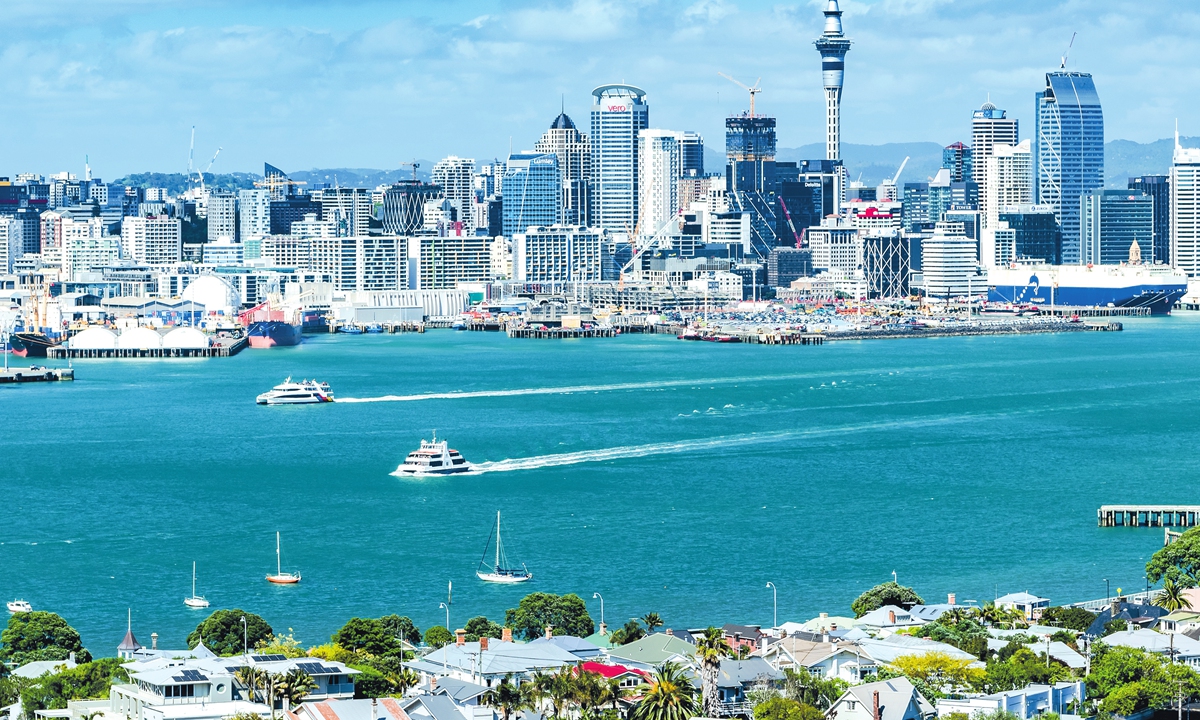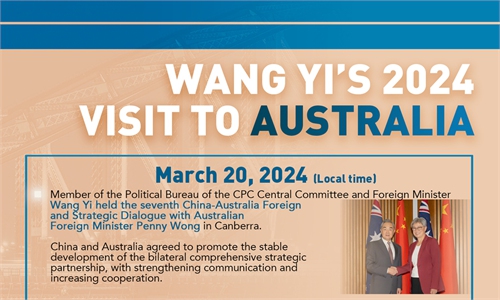10 years on, China-New Zealand cooperation to reach new levels with infrastructure, green transition under BRI in spotlight
China-New Zealand cooperation under BRI sets demonstration effect to promote regional integration

A view of Auckland city Photo: VCG
This year marks the 10th anniversary of the China-New Zealand comprehensive strategic partnership. Chinese Foreign Minister Wang Yi just wrapped up his official visit to New Zealand, and his New Zealand visit has kicked off this year's high-level exchanges between the two countries.
In March 2017, New Zealand became the first Western developed country to sign a cooperation agreement with China on the China-proposed Belt and Road Initiative (BRI). Since the establishment of diplomatic relations between China and New Zealand in 2017, the two countries had set numerous records of "firsts," driving bilateral relations to the forefront of China's relations with developed countries. For instance, China remains New Zealand's largest trading partner; New Zealand was the first Western country to support China's accession to the WTO and the first to decide to join the Asian Infrastructure Investment Bank.
One decade on, the two countries have made significant achievements especially under the BRI framework, as infrastructure, trade, financial and people-to-people connectivity have been greatly enhanced.
Standing at a new starting point, China-New Zealand trade and economic ties will be further consolidated thanks to Wang's just-concluded visit, which will push bilateral relations to a higher level, officials and experts said. They noted that the BRI cooperation between the two countries has a demonstration effect on neighboring countries, promoting regional economic integration and co-development.
Bright prospects
During Wang's visit, he held talks with New Zealand's Deputy Prime Minister and Minister of Foreign Affairs Winston Peters in Wellington. Wang said the Chinese side stands ready to work with the New Zealand side to leverage the strong economic complementarity, implement the upgraded China-New Zealand Free Trade Agreement, launch negotiations on the negative list of trade in services at an early date, and build new growth engines such as infrastructure, green transition, digital economy, technological innovation, and climate response.
Both sides should continue to improve conditions for personnel exchanges, hold various activities to celebrate the 10th anniversary of the establishment of the China-New Zealand comprehensive strategic partnership, deepen people-to-people and cultural exchanges in such fields as education, tourism and youth and at the sub-national level, Wang noted.
"Wang Yi's visit will take bilateral ties to a higher level by deepening economic and trade relations and enhancing political mutual trust. His visit may provide an opportunity for both sides to hold in-depth exchanges on international and regional issues of common concern, enhance mutual understanding and trust, and promote the process of cooperation," Wang Jiazheng, chief representative of Guangdong Economic and Trade Representative Office in New Zealand, told the Global Times on Thursday.
Jason Chen, head of the New Zealand-China Travel Exchange Association, who also owns a travel agency in New Zealand, told the Global Times earlier that he has high expectations for the high-level government meetings during Wang Yi's visit in terms of a possible boost for the tourism industry in the island country.
"With high-level visits, we expect to boost the development of the tourism industry in both China and New Zealand. Booming tourism will help further revive the New Zealand tourism industry and boost its economy," Chen said.
At the same time, the tourism industry insider said that as the bilateral relationship becomes closer, the New Zealand government might consider introducing short-term visa-free policies for Chinese tourists, making it more convenient for Chinese to visit the island country for sightseeing and tourism.
Noting the existing cooperation under the BRI, Wang Jiazheng said that at present, a number of projects have been implemented. Since New Zealand became the BRI partner country in 2017, the two sides have collaborated in such areas as infrastructure construction, trade cooperation and people-to-people exchanges, and have achieved some positive results.
For example, the New Zealand-China Commodity Expo 2024, hosted by the Chinese Ministry of Commerce, will land in New Zealand in September this year, which will further promote the trade cooperation between the two countries, and inject new vitality through more economic and trade exchanges, Wang noted.
"Looking ahead, the two sides can continue to strengthen cooperation in infrastructure development, especially in the areas of transportation, energy and communications, in order to provide better infrastructural support for the economic development of both countries," Chen Hong, director of the Australian Studies Center at East China Normal University, told the Global Times on Thursday.
Chen noted that digital economy and green development are also highlighted as areas of future collaboration.
"If the New Zealand government can uphold the thinking of independent diplomacy and discard external political disturbances, I believe that the potential for cooperation between China and New Zealand under the BRI framework is enormous," Chen said.
Demonstration effect
The high-quality construction of the BRI has brought tangible benefits to partner countries, including improving infrastructure construction as well as creating jobs, Chen noted.
"New Zealand's increased cooperation with China on the BRI contradicts the lies such as "debt traps" that some other Western countries have made up, and the BRI collaboration with New Zealand will help more economies understand the realities of the initiative," Chen noted.
The experience and results accumulated in the cooperation between China and New Zealand can serve as a model for other countries and promote the participation of more countries in the joint construction of the BRI. In addition, the cooperation with New Zealand, as a Western developed country, can prove the possibility and value of the BRI to other developed countries, Wang Jiazheng noted.
In addition, the BRI cooperation between the two countries has a demonstration effect for neighboring countries, as this cooperation can further promote regional economic integration and common development, Wang Jiazheng noted.
"The strong China-New Zealand relationship also serves as a model, particularly for Australia, to learn from, especially after the downturn in China-Australia relations during the previous Morrison administration," Chen said, calling for more efforts and determination to work with China to together boost the economic development of the Asia-Pacific region.


